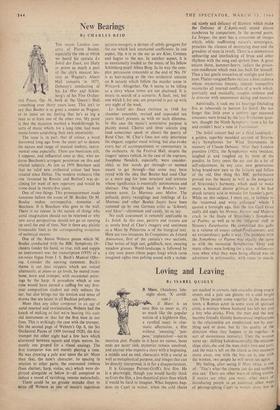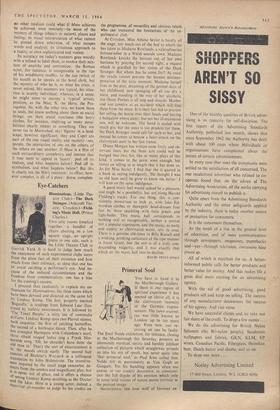Loving and Leaving
By ISABEL QUIGLY cate.)
// Mare is an
easy film to sneer at, it's so much like the popular notion of a highbrow film, a rarefied essay in eine- , matic affectation, a film without `meaning,' pur- pose,"explanation'—not to mention plot. People in it have no names, loose ends are never tied, mysteries remain unsolved, and anyone who expects a story with a beginning, a middle and an end, characters with a social as well as metaphysical purpose, and images that can be directly interpreted, is in for a disappointment.
It is Giuseppe Patroni-Griffi's first film. He is a playwright, though you would hardly think so from the film, a less theatrical piece than which it would be hard to imagine. What happens hap- pens on Capri in winter, when the cafe chairs
are stacked in corners, rain cascades along empty streets and a pale sun gleams on a cold bright sea. Three people come together in the deserted town, a Roman actor in some state of spiritual crisis, a woman whose husband has left her and a boy who drinks. First, the man and the boY become friendly (faintly homosexual implications in the relationship are emphasised. not by any- thing said or done, but by the quality of the direction when they happen to be together a sort of momentous intensity). Then the woman turns up: shifting kaleidoscopically, the relation- ships alter, she and the man make love and part: and the man is left on the island as two steamers move away, one with the boy on it, one with the woman, two people he will never see again. My feeling, after seeing II Mal:e twice, is one of: 'That's what the cinema can do and nothing else can.' There are other ways of telling stories. if stories are what you want, other ways of introducing people to an audience, other ways of photographing Capri in winter, even; but In
no other medium could what II Mare achieves be achieved, even remotely—its sense of the mystery of things (objects or nature), places and feeling; its visual interpretation of what cannot be pinned down otherwise, of what escapes words and analysis; its circuitous approach to a reality, at once sophisticated and violent.
Its accuracy on today's manners goes weirdly with a refusal to label them, to resolve their mix- ture of .anarchy and convention: the Roman actor, for instance, is recognisable to the tips of his windblown muffler, to the last twitch of his mouth as he speaks to the hotel clerk, but the mystery of who he is, or what his crisis, is never solved. His manners are typical, his situa- tion is acutely individual; whereas, in a sense, he might seem to occupy a 'typical' artistic position, as the Man, X, the Hero, the Pro- tagonist..So, with the other two, we know them as souls, but know nothing about them as social beings; yet their social exactness (the boy's clothes, for instance, implying so many possi- bilities) clearly relates to something. They are never (as in Marienbad, say) 'figures' in a land- scape, however significant; they and Capri are part of the one visual reality and mystery—sea, people, the interaction of one on the others, of the others on one another. II Mare is a film of such extraordinary complexity and interest that it may seem to appeal in 'layers': peel off its realism, and what happens below? Peel off its symbolism, and what happens below? But this is clearly not the film's intention: its effect, how- ever complex, is all of a piece: dense, complete.



































 Previous page
Previous page